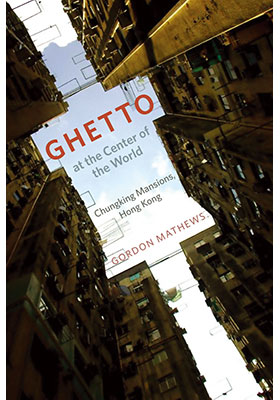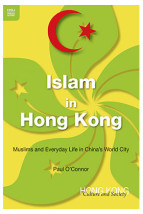Ghetto at the Center of the World
Chungking Mansions, Hong Kong
(世界中心的貧民窟:香港重慶大廈)
ISBN : 978-988-8083-36-7
August 2011
256 pages, 6″ x 9″, 32 b&w illustrations
For sale in the Greater China area (Hong Kong, the Mainland, Macao, Taiwan), Australia, and New Zealand only
- HK$170.00
Chungking Mansions, a dilapidated seventeen-story commercial and residential structure in the heart of Hong Kong’s tourist district, is home to a remarkably motley group of people. Traders, laborers, and asylum seekers from all over Asia and Africa live and work there, and even backpacking tourists rent rooms in what is possibly the most globalized spot on the planet. But as Ghetto at the Center of the World shows us, the Mansions is a world away from the gleaming headquarters of multinational corporations—instead it epitomizes the way globalization actually works for most of the world’s people. Through candid stories that both instruct and enthrall, Gordon Mathews lays bare the building’s residents’ intricate connections to the international circulation of goods, money, and ideas.
“In this wonderful book Gordon Mathews takes on an intriguing project: daily life as it is lived, articulated, dreamed, denied, regretted, and defended in a rather rundown but very public building in Hong Kong. The residents of Chungking Mansions are economically blocked from the rest of the city and often racially discriminated against, so how do such marginalized people survive, much less prosper? This is the conundrum at the heart of Ghetto at the Center of the World. Mathews tackles it by providing a vivid description of the people who live their lives in the building’s dimly lit hallways, restaurants, and shops, and by analyzing the larger material and political forces at work. The resulting account is as informative and revealing as it is entertaining.” —William Jankowiak, author of Sex, Death, and Hierarchy in a Chinese City
“Chungking Mansions is a microcosm of globalization but with a special twist: it shelters and nurtures the small-time players who inhabit the lower tiers of transnational capitalism. Postcolonial Hong Kong remains a platform for suitcase entrepreneurs who travel the world in pursuit of profit and business connections. The Mansions may seem seedy and dangerous to the titans who run Hong Kong, but, as Mathews’ account makes clear, it is a paradise for business travelers on a minimal budget. Anyone who seeks insights into the soft underbelly of global capitalism should read this book.” —James l. Watson, coauthor of Village Life in Hong Kong


